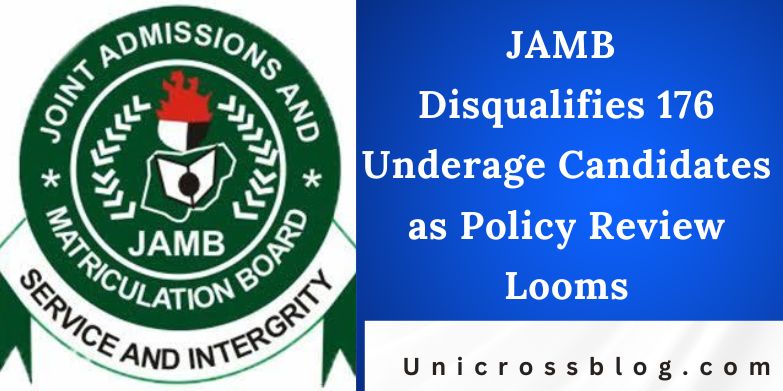The Joint Admissions and Matriculation Board (JAMB) conducted a screening exercise for 176 exceptional underage candidates who achieved high scores in the 2025 Unified Tertiary Matriculation Examination (UTME). This initiative coincides with indications from the House of Representatives Committee on Basic Examination Bodies that it is considering a review of the controversial admission age policy. The screening, aimed at ensuring that only outstanding and well-prepared candidates below the age of 16 are admitted into tertiary institutions for the 2025/2026 academic session, was carried out by experts assembled by JAMB. The exercise took place simultaneously in Abuja, Owerri, and Lagos, reflecting a coordinated effort to identify and nurture young talent across Nigeria.

Screening Process and Execution
In Abuja, the screening was overseen by Prof. Taoheed Adedoja, Chairman of the Abuja Centre, who expressed satisfaction with the smooth execution of the process. Adedoja, a former Minister of Sports, outlined the screening procedure, which involved a multi-stage evaluation. Candidates first completed a written examination lasting approximately 20 minutes. Their papers were marked promptly, after which they proceeded to a second session, followed by a third, culminating in face-to-face interviews. This rigorous process was designed to assess the candidates’ academic abilities and readiness for tertiary education. Adedoja noted that 22 candidates participated at the Abuja centre, while the total number of candidates screened nationwide was 176.
National Assembly’s Involvement and Support
The screening exercise drew attention from key stakeholders, including members of the National Assembly. Senator Mohammed Muntari Dandutse, Chairman of the Senate Committee on Tertiary Institutions and TETFund, monitored the exercise and commended JAMB for providing a platform for talented underage candidates to showcase their potential. Dandutse emphasized the National Assembly’s commitment to supporting President Bola Tinubu’s education policies, which aim to drive national development. He also praised JAMB for its consistency and transparency in conducting examinations and related processes, highlighting the board’s role in maintaining high standards in Nigeria’s education system.
House Committee’s Observations and Policy Review
Similarly, Oboku Oforji, Chairman of the House of Representatives Committee on Basic Examination Bodies, visited the Abuja venue and lauded the young candidates for their exceptional performance. Oforji described their achievements as a reflection of Nigeria’s competitiveness in education across Africa. He noted that the outstanding results demonstrated by these underage candidates are a source of national pride, underscoring the potential of Nigeria’s youth to excel on a global stage.
The screening exercise comes at a time when the House of Representatives Committee on Basic Examination Bodies has signaled its intent to review the controversial admission age policy. This policy, which has sparked debates in recent years, sets a minimum age requirement for admission into tertiary institutions. The proposed review aims to address concerns about the policy’s impact on exceptionally gifted young students who may be ready for higher education despite being below the stipulated age. Oforji reiterated the committee’s commitment to supporting JAMB and other examination bodies to ensure they can effectively fulfill their mandates. He emphasized the importance of creating an enabling environment for young talents to thrive, particularly through policies that balance academic readiness with age considerations.
JAMB’s Broader Objectives
The screening of underage candidates is part of JAMB’s broader efforts to promote fairness and inclusivity in Nigeria’s education system. By providing opportunities for high-achieving young students, JAMB aims to identify and nurture the next generation of leaders and innovators. The exercise also highlights the board’s commitment to maintaining rigorous standards while adapting to the evolving needs of the education sector. The involvement of high-profile stakeholders, including members of the National Assembly, underscores the significance of this initiative in the context of Nigeria’s educational and developmental goals.
Future Implications and Conclusion
As the review of the admission age policy progresses, stakeholders are hopeful that it will lead to a more flexible framework that accommodates exceptional talents while maintaining the integrity of the education system. The success of the 176 underage candidates in the 2025 UTME screening exercise serves as a testament to the potential of young Nigerians to excel academically when given the right opportunities. JAMB’s efforts, coupled with legislative support, are expected to pave the way for policies that better serve the needs of gifted students, ensuring that Nigeria continues to produce globally competitive graduates.
READ ALSO: Updated JAMB Areas of Concentration for Art 2026/2027
FAQs
What is the purpose of JAMB’s screening of underage candidates?
The screening is designed to evaluate exceptional candidates under 16 who scored high in the 2025 UTME, ensuring they are well-prepared for admission into tertiary institutions for the 2025/2026 academic session.
How many candidates participated in the screening exercise?
A total of 176 candidates were screened nationwide, with 22 participating at the Abuja centre.
What was the screening process for the underage candidates?
The process involved a written examination lasting about 20 minutes, followed by marking, additional sessions, and face-to-face interviews to assess the candidates’ readiness.
Where was the screening exercise conducted?
The screening took place simultaneously in Abuja, Owerri, and Lagos.
Who oversaw the screening in Abuja?
Prof. Taoheed Adedoja, Chairman of the Abuja Centre and a former Minister of Sports, oversaw the exercise in Abuja.
What did the National Assembly say about the screening?
Senator Mohammed Muntari Dandutse and Oboku Oforji commended JAMB for its transparency and for providing a platform for talented underage candidates. They also expressed support for President Tinubu’s education policies.
What is the admission age policy, and why is it controversial?
The admission age policy sets a minimum age for entry into tertiary institutions, sparking debate over its impact on gifted young students who may be ready for higher education earlier.
What is the House of Representatives Committee planning regarding the admission age policy?
The House Committee on Basic Examination Bodies has indicated plans to review the policy to address concerns and better accommodate exceptional young candidates.
How does the screening reflect Nigeria’s education system?
The success of the underage candidates highlights Nigeria’s competitiveness in education across Africa and the potential of its youth to excel when given opportunities.
What is JAMB’s broader goal with this initiative?
JAMB aims to promote fairness and inclusivity in education by identifying and nurturing young talents while maintaining high academic standards.







